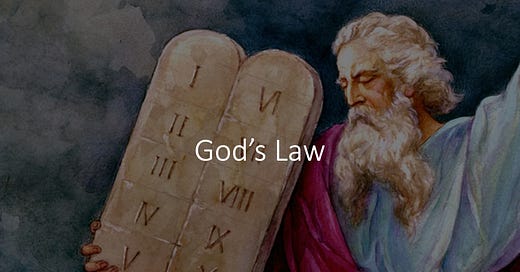Sirach 15:16-21; 1 Corinthians 2:6-10; Matthew 5:17-37
Psalm 119 is the longest in the Bible and it presents God’s Law as the source of happiness, wisdom, and life (Ps. 119:1, 93, 98). The psalm has 22 stanzas, one for each letter of the Hebrew alphabet and in the eight verses dedicated to the smallest letter of the Hebrew alphabet - yod (Ps. 119:73-80; Matt. 5:18) - the psalmist speaks about delight he finds in God's teaching and his commitment to study and follow the laws of God in life.
"Do not think that I have come to abolish the Law or the Prophets" (Matt. 5:17). Jesus comes from the Father to bring levitical priesthood, all the sacrifices, and the temple in Jerusalem to completion (Rom. 10:4). He is the High Priest, the Sacrifice, and the Temple (Heb. 9:11; 10:8-14; John 2:21). But at the same time, He sets moral standards even higher than the Old Testament: “unless your righteousness exceeds that of the scribes and Pharisees, you will never enter the kingdom of heaven” (Matt. 5:20). What does it mean? There is righteousness under the Law (Phil. 3:6) and there is also the righteousness of God (Rom. 1:17). You can be blameless according to the first one and yet without having the second one (Luke 18:14). Why? Because hatred was in your heart and you despised your brother.
God created “heaven and earth” (Gen. 1:1; Matt. 5:18) and God gave the Torah (Ex. 20:1). Quantum physics discovered the power of tiny particles of the universe that make nuclear energy and Jewish grammar teaches us that the smallest letter of the Hebrew alphabet is the first letter in such important words like Israel, Jerusalem, Jesus, and even in God’s Holy name (Ex. 3:14). Before the coming of Christ, the created world and the revealed Law were the two sources of God’s revelation. By discovering the laws of the universe one could discover the One who wrote those laws into the universe and by studying the Torah one can get to know the One who wrote the Torah.
The impersonal “it was said” is contrasted with “but I say", the prescriptions of the past are contrasted with the present teaching of Jesus (Matt. 5:21-22,27-28,31-34). Today Jesus teaches about anger, lust, divorce, and oaths. In the New Testament, anger is as serious as murder had been in the Old Testament, lust is a problem of heart, and both divorce and oaths are not accepted. Jesus does not “abolish” the Law, He intensifies it.
The “anger” Jesus has in mind depicts a habitual state of being angry with someone rather than a specific act of anger. In the case of lust, a question arises: why do we look at something? In order to exploit it? Moses’ permission for divorce took into account the problem of the human heart - its hardness (Mark 10:5) but divorce was never part of God’s plan (Mark 10:6; see Mal. 2:16). Jesus has come to heal this heart, leading to that original unity that existed between Adam and Eve in Eden (Mark 10:6). Finally, Jesus’ teaching about oath reveals the sacredness of the universe: heaven is the throne of God, the earth is his footstool, and Jerusalem is the city of the great King (Matt. 5:34-35). Why would someone call them to witness their words? And how about our “head” (Matt. 5:36)? Would bringing our "head" into discussion make our words more convincing?
God does not command to act unjustly and “to none does he give license to sin” (Sirach 15:20). By studying God’s law, we discover that “secret and hidden wisdom of God” of which Paul speaks in today’s second reading (1 Cor. 2:7). By keeping God's law wholeheartedly (Ps. 119: 34) we discover "what God has prepared for those who love him" (1 Cor. 2: 9) - the mysteries of God's Kingdom.




